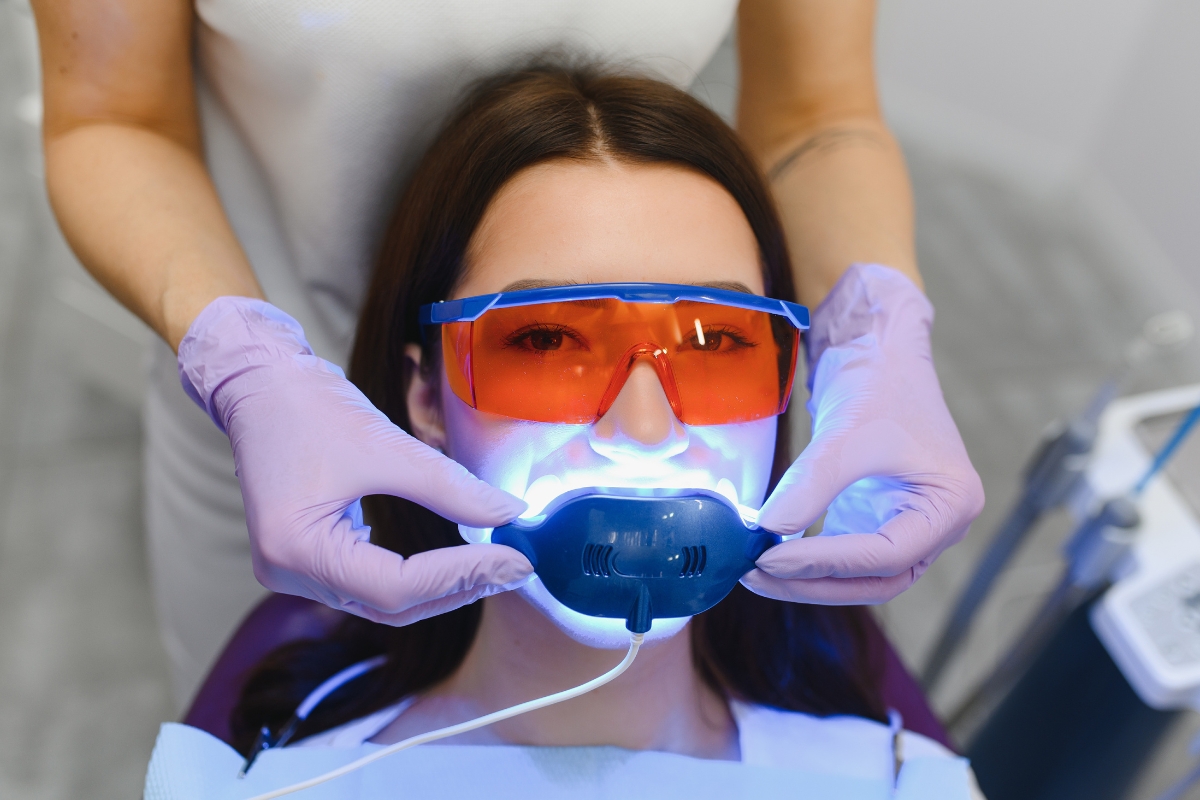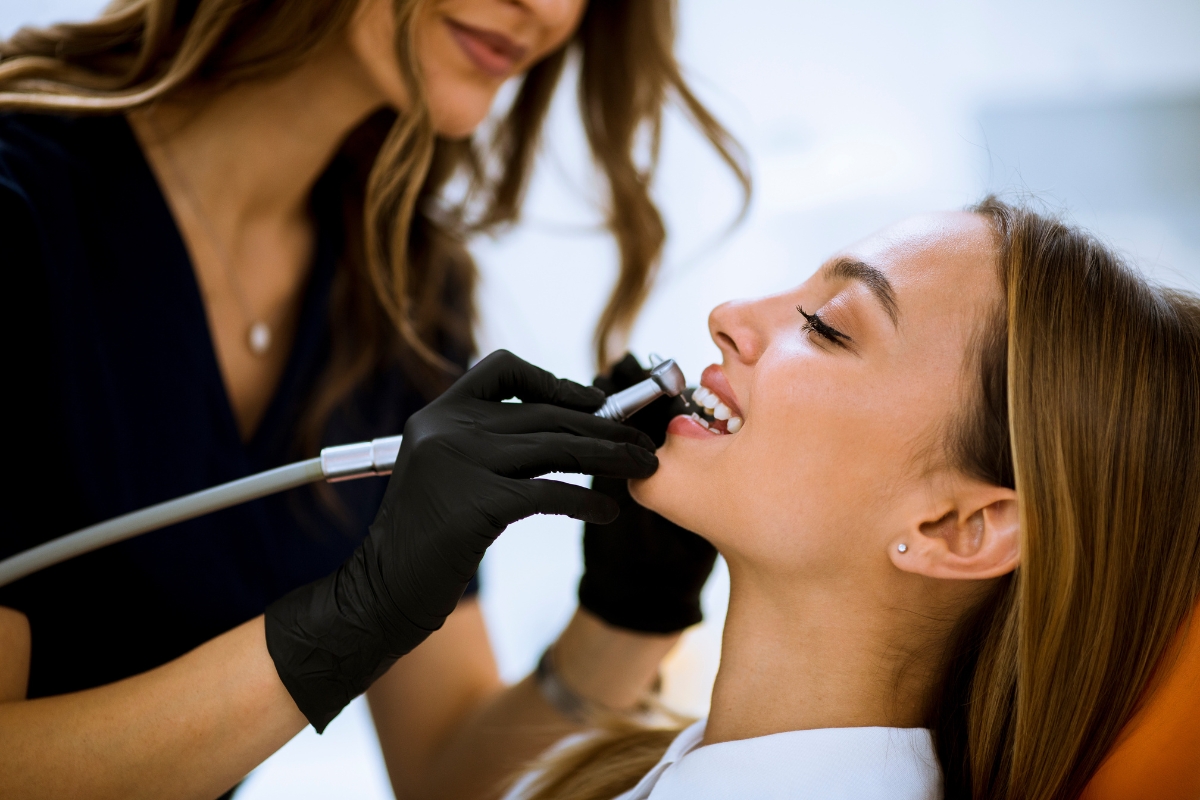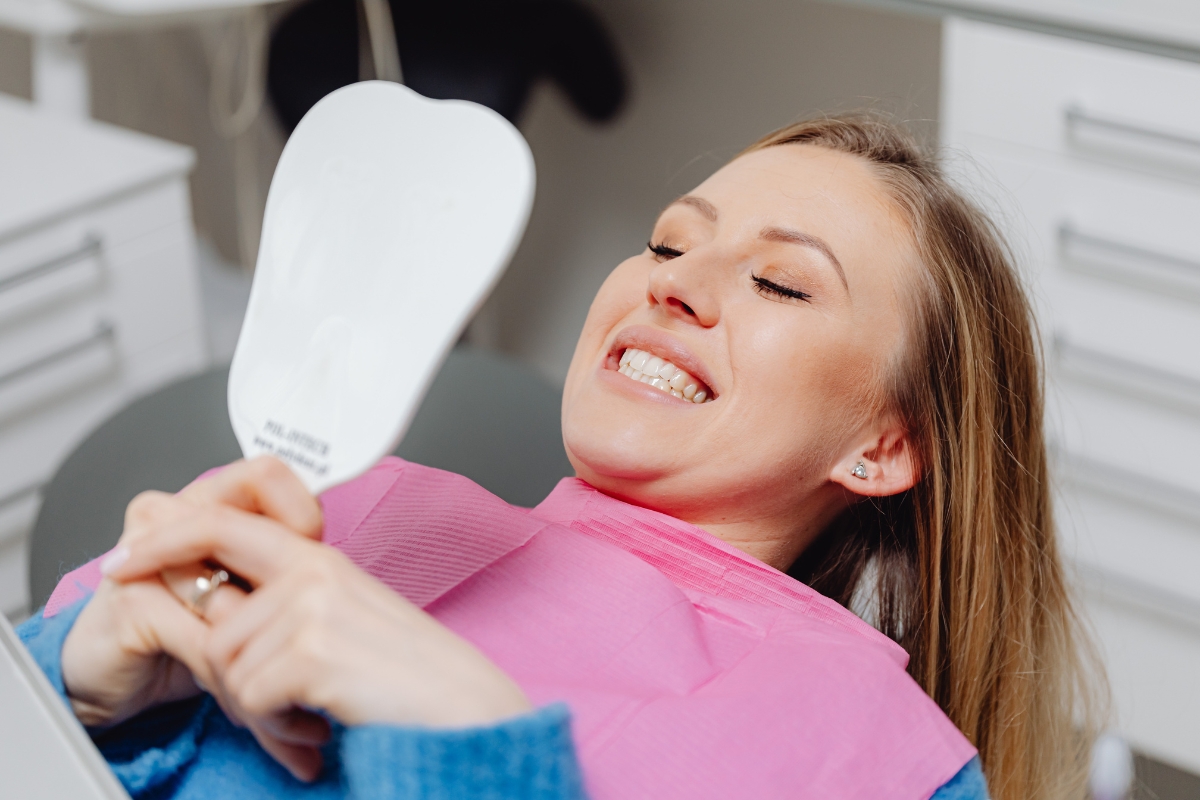4620 East Douglas, Suite 100 Wichita, KS 67208

Do you dream of a brighter smile but dread the discomfort that often comes with teeth whitening? You’re not alone. Many people with sensitive teeth find themselves shying away from whitening treatments simply because they may be painful. However, it doesn’t have to hurt to achieve a gleaming smile.
In this blog, Dr. Terra Pauly shares her professional advice on how to whiten sensitive teeth while causing minimal discomfort. Let’s dive in to see how one can achieve professional teeth whitening without those painful side effects.
Understanding Sensitive Teeth and Whitening Treatments
Tooth sensitivity arises from worn-down enamel that protects your teeth or from receding gums that expose the softer part of your tooth called dentin. This makes your teeth more sensitive to changes in temperature and certain products.
Whitening treatments may further contribute to sensitivity. Most contain hydrogen peroxide or carbamide peroxide, which penetrate the enamel to degrade stains. This action could irritate exposed dentin and create discomfort.
Consumption of acidic foods and drinks increases the discomfort, leaving teeth even more sensitive during the treatment process. Knowing why sensitivity plays a major role can make all the difference in the selection of a whitening solution.
Dr. Terra Pauly’s Top Tips for Whitening Sensitive Teeth
Tip #1: Choose the Right Whitening Treatment
Whitening treatments are not created equal. Professional teeth whitening in Wichita offers a safe and controlled environment for brighter teeth, especially for sensitive smiles.
According to Dr. Pauly, any whitening should start with a professional whitening session to minimize risks. At-home treatments are often more convenient, but they can contain harsher chemicals that make sensitivities worse.
If you are someone who would prefer at-home whitening, choose whitening gels with low concentrations of peroxide.
Tip #2: Use Desensitizing Toothpaste
Desensitizing toothpaste blocks the pain signals to the nerves inside your teeth, reducing the discomfort. Dr. Pauly recommends a fluoride-based toothpaste containing potassium nitrate, which he says relieves sensitivity well before whitening.
By including this in your daily routine, the whitening can occur more smoothly and painlessly.
Tip #3: Take breaks between treatments
Whitening too frequently can over-sensitize the teeth. Dr. Pauly recommends breaks between treatments to give your teeth time to recover.
For sensitive teeth, spacing treatments two weeks apart is recommended to prevent discomfort while still achieving optimal results.
Tip #4: Be Cautious with Whitening Gel
When you are applying whitening gel at home, be careful around the gum areas. The gel will burn your gums and create inflammation, especially if it is left on for too long.
Dr. Pauly presents that one should apply the gel precisely and use a tray that perfectly fits to avoid any excess spilling of the gel on the gums.
Advantages of Professional Teeth Whitening with Dr. Terra Pauly
With professional teeth whitening in Wichita by Dr. Pauly, there are many options for sensitive teeth, which he is happy to discuss with you. A dentist will be able to evaluate your specific situation and recommend a whitening system that best fits your needs.
Professional treatments employ stronger active ingredients in their products compared to over-the-counter options. However, they are applied in a controlled manner. Moreover, you get professional attention that keeps tabs on your comfort level during the procedure to make sure that your treatment is both effective and safe.
Aftercare Tips to Maintain a Bright Smile
Your teeth might be a little sensitive after whitening. Dr. Pauly recommends continuing with the desensitizing toothpaste to alleviate any remaining sensitivity. For the first few days, stay away from any foods that may be acidic or very hot in temperature, as this can further cause sensitivity.
Try sipping liquids through a straw to minimize stains from food and drinks on your teeth. Maintaining good oral hygiene and following up with regular check-ups will keep your smile shining bright and healthy.
Whitening your teeth doesn’t have to be painful. With the professional teeth whitening tips that Dr. Pauly provides, you can brighten up your smile with the least discomfort. First, use the right products. Second, desensitize with toothpaste, and third, take breaks between treatments for optimal whitening.
Are you ready to whiten safely and comfortably? Contact Dr. Terra Pauly today! Come in for a consultation to learn more about professional teeth whitening options customized for sensitive smiles.
FAQs
How often should I whiten my teeth with sensitivity?
For sensitive teeth, it’s best to space whitening sessions about two weeks apart. Overuse can worsen sensitivity, so taking breaks allows your teeth to recover while still achieving effective results.
What can I do if my gums are irritated after whitening?
If your gums are irritated, avoid whitening treatments for a few days. Use a soothing gel or saline rinse to calm irritation, and apply whitening products more carefully to avoid gum contact.
What foods should I avoid after whitening?
After whitening, it’s best to avoid foods and drinks that can stain, such as coffee, tea, red wine, and dark berries. Eating lighter-colored foods can help maintain your brighter smile.
Is teeth whitening safe for everyone?
Teeth whitening is safe for most people, but individuals with gum disease, tooth decay, or very sensitive teeth should consult a dentist before using whitening products to ensure safety.
Is teeth whitening safe during pregnancy?
Although professional teeth whitening is generally considered safe, it’s advised to avoid treatments during pregnancy due to the limited research on the effects of whitening agents on pregnant women.


